INSTITUTIONALIZATION OF ECOLOGICAL AND ECONOMIC IMPACT OF TERRITORIAL COMMUNITIES ON RECREATIONAL FOREST MANAGEMENT ENTITIES IN THE CONTEXT OF DECENTRALIZATION
Abstract
The article substantiates the author's approach to the formation of a regulatory mechanism for activating recreational activities through the institutionalization of the ecological and economic impact of territorial communities on the subjects of recreational forest use, taking into account a wide range of opportunities formed as a result of deepening decentralization, in particular, deregulation of land relations. It is established that the institutionalization of the ecological and economic impact of territorial communities on the subjects of recreational forest use should cover a set of tools for economic incentives and tools for compliance with the requirements of environmental legislation in order to increase the interest of producers of this type of recreational services to accompany the processes of economic development of the natural and recreational potential of forests with permanent reproduction of the assimilation capacity of forest biogeocenoses. It is proved that the institutionalization of tools of ecological and economic influence of local self-government on the subjects of recreational entrepreneurship will allow obtaining an economic and environmental effect both for forestry and for the local economic complex as a whole, in particular in terms of expanded reproduction of the resource and production potential of related activities (local construction industry, wood processing sector, production of building wooden structures, public catering and retail trade). It is proved that the economic effect will consist in increasing the complexity of the use of forest resource potential, commercialization of useful properties of forest biogeocenoses, additional involvement in the economic turnover of self-planted and unproductive agricultural land. It is established that the ecological effect will be manifested in strengthening the ecological stability of forest biogeocenoses, preserving and increasing forest biodiversity, and improving the environmental functions of forests. It is proved that the key element of institutionalization of ecological and economic influence of local self-government on the processes of recreational forest management should be the creation of a special fund for forestry development in the structure of budgets of territorial communities, and one of the priorities for the targeted use of funds accumulated in it should also be the economic development of the natural and recreational potential of forests.
References
Воловик В.М. Ландшафтний аналіз рекреаційних умов та ресурсів Східного Поділля. Автореф. дис. на здобуття наук. ступеня канд. геогр. наук. Київ, 1997. 23 с.
Ільїна М.В., Шпильова Ю.Б. Сутнісні характеристики системи сталого рекреаційного природокористування на сільських територіях України. Бізнес, економіка, сталий розвиток, лідерство та інновації. 2018. №1. С. 16–25.
Калуцький І.Ф., Зарічняк А.П. Сучасні проблеми рекреаційного лісокористування в Горганах (на прикладі ДП «Осмолодське лісове господарство»). Карпатський край. 2018. № 1-2(12-13). С. 136–145.
Карий О.І., Глинський Н.Ю. Об’єднання зусиль територіальних громад з метою використання їх туристично-рекреаційного потенціалу. Ефективна економіка. 2020. № 5. URL: http://www.economy.nayka.com.ua/pdf/5_2020/17.pdf
Мельник А., Мельник Н., Качаровський Р., Єрко І. Можливості використання туристично-рекреаційного потенціалу в умовах децентралізації (на прикладі ОТГ Волинської області). Часопис соціально-економічної географії. 2021. Випуск 30. С. 67–75.
Приліпко С.М. Розвиток обслуговуючої кооперації сільських територій: теорія та практика : монографія. Київ : ТОВ «Август Трейд», 2019. 372 с.
Volovyk V.M. (1997) Landshaftnyi analiz rekreatsiinykh umov ta resursiv Skhidnoho Podillia [Landscape analysis of recreational conditions and resources of Eastern Podillia]. Avtoref. dys. na zdobuttia nauk. stupenia kand. heohr. nauk. Kyiv, 23 p.
Ilina M.V., Shpylova Yu.B. (2018) Sutnisni kharakterystyky systemy staloho rekreatsiinoho pryrodokorystuvannia na silskykh terytoriiakh Ukrainy [Essential characteristics of the system of sustainable recreational nature use in rural areas of Ukraine]. Biznes, ekonomika, stalyi rozvytok, liderstvo ta innovatsii, vol. 1, pp. 16–25.
Kalutskyi I.F., Zarichniak A.P. (2018) Suchasni problemy rekreatsiinoho lisokorystuvannia v Horhanakh (na prykladi DP «Osmolodske lisove hospodarstvo») [Modern problems of recreational forest use in Gorgany (on the example of SE "Osmolod Forestry")]. Karpatskyi krai, vol. 1-2(12-13), pp. 136–145.
Karyi O.I., Hlynskyi N.Iu. (2020) Obiednannia zusyl terytorialnykh hromad z metoiu vykorystannia yikh turystychno-rekreatsiinoho potentsialu [Uniting the efforts of territorial communities in order to use their tourist and recreational potential]. Efektyvna ekonomika, vol. 5. Available at: http://www.economy.nayka.com.ua/pdf/5_2020/17.pdf
Melnyk A., Melnyk N., Kacharovskyi R., Yerko I. (2021) Mozhlyvosti vykorystannia turystychno-rekreatsiinoho potentsialu v umovakh detsentralizatsii (na prykladi OTH Volynskoi oblasti) [Possibilities of using tourism and recreation potential in the conditions of decentralization (on the example of OTG of Volyn region)]. Chasopys sotsialno-ekonomichnoi heohrafii, vol. 30, pp. 67–75.
Prylipko S.M. (2019) Rozvytok obsluhovuiuchoi kooperatsii silskykh terytorii: teoriia ta praktyka : monohrafiia [Development of service cooperation in rural areas: theory and practice: monograph]. Kyiv : TOV «Avhust Treid», 372 p.


